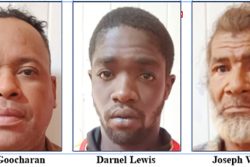Dear Editor,
In his letter to the press (‘Guyana needs a new group of thinkers,’ SN July 18), Mr Rakesh Rampertab, among other things, accuses me of being disrespectful and “imperial” for ignoring one of his previous letters. Although disrespect was not my intention, it clearly had that effect on Mr Rampertab. I, therefore, wish to apologize to him. Since I don’t know what he meant by “imperial” I can’t respond to that.
Now to the substance of his letters. Mr Rampertab’s definitive assertion that there was only one split of the PPP leaves little or no room for discourse. This assertion came in the midst of the recent exchanges between Speaker Ramkarran and a few of us, which were premised on the understanding there were two splits. Mr Rampertab dismissed the premise of the discussion. According to him I repeated my opinion although he “refuted” it. I don’t know that one refutes something by a simple declaration. He went a bit further in his recent letter by saying there was one split because “for fifty years everyone saw one split in 1955.”
Mr Rampertab’s insinuation that I am the only one who “discovered” a second split is not very accurate. There is an eminent Guyanese who also saw two splits – Dr Cheddi Jagan. Here Is Dr Jagan on p 175 of The West on Trial: “Soon after the rightist split of 1955, there occurred an ‘ultra left’ split. Rory Westmaas, Martin Carter, Lionel Jeffrey and a few others virtually seceded in 1956 after disciplinary action was taken against Keith Carter for flouting party instructions, and after I had criticized them in a paper I had submitted to the 1956 Party Congress.” Mr Rampertab either didn’t read The West on Trial properly or forgot what he read, as I never saw a letter from him asking Dr Jagan where and how he “discovered” two splits. Perhaps he may want to do so now. Even though Dr Jagan is dead I am sure members of the PPP would be more than happy to engage Mr Rampertab on this issue. I should not be blamed for Mr Rampertab’s confusion over declaration and refutation. Had he challenged me on my obvious emphasis on the second split, I would have been glad to explain to him why I think equal emphasis should be placed on it. If I am “discovering” anything, it’s not the split itself but that more importance should be attached to it.
There is one other aspect of Mr Rampertab’s letter I would like to address briefly. He complains that members of the PPP, PNC and WPA dominate the national discourse and that this should be ended. He cites his own feeling of marginalization from the discourse as arising from the fact that he has not belonged to any of these parties. It is true that the PNC and the PPP frequently make news and their members are called upon to comment on the news of the day. But they are the government and the main parliamentary opposition – what they do is news. One can, however, understand Mr Rampertab’s concern that the media need to cast a wider net. But Mr Rampertab is wrong about the WPA – that party hardly makes news. Many of its press releases are ignored by the media. Every now and then the press quotes Drs Thomas and Roopnaraine or Andaiye and Karen DeSouza in their capacity as Red Thread activists. The last time I was quoted in the press was 2003 during the height of the Buxton siege. The last time I checked there were two other people who are quoted frequently in the press, Mr Khemraj Ramjattan and Mr Raphael Trotman, who are not members of the three offending parties. But it is true that Eusi Kwayana, Tacuma Ogunseye and I write frequently in the letter section. But so do many others. In fact some non-party letter writers such as Emile Mervin write more frequently than we do.
Mr Rampertab has to make up his mind who he wants off the scene – old people or people who belong to the three parties. Like Mr Rampertab I am of the 1980s generation and so too are most of the activists/members or former members of the PPP, PNC and the WPA. I don’t know what he means by “lost generation without a strong voice in the political affairs of our country and one which was nurtured under the weight of Mr Forbes Burnham and his friend Dr Jagan produced no political figure who truly speaks in our tongue.” Perhaps he may want to revisit that declaration – substituting ‘me’ for ‘our’ most often leads you down a blind alley. As Freddie Kissoon has suggested the 1980s generation may be justified if they charge Mr Rampertab with slander.
Finally, a parting shot. There is a strong tendency among people across generations to be flippant or dismissive of history or the history they don’t like. That is dangerous. No society advances without its history, for therein lies its culture and reason for being. History is always being contested and revised as new generations engage it. And yes, it often includes “old quarrels.” Americans, for example, are still quarrelling about the Independence and Civil Wars. The present and the future are aggregates of the past. Today we talk of slavery, indentureship and colonization not to re-live the past or quarrel about it, but to understand how we got to the present. It’s counterproductive to suggest to young people to ignore history and old voices, however unpleasant the discourse may be. As the calypsonian, Black Stalin, would put it “Old people/voices/story is people/voices/story too.”
Yours faithfully,
David Hinds






